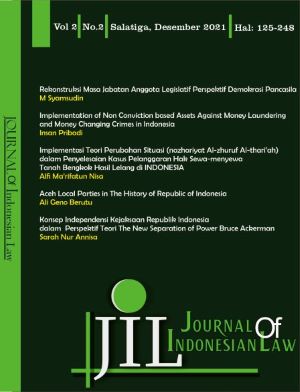KEABSAHAN ẒIHAR SEBAGAI PUJIAN MENURUT PERSEPSI TEUNGKU DAYAH KECAMATAN JULI, BIREUEN
DOI:
https://doi.org/10.18326/jil.v5i1.2235Keywords:
Ẓihar, Teungku Dayah's PerceptionAbstract
Ẓihar is historically a form of disliking a husband or a form of punishment towards his wife. The wife's status becomes dependent, unclear, she cannot marry someone else, and has no right to claim anything. In this context, the wife feels like she is being bullied and feels psychologically hurt by her husband. Islam then came to reconstruct ẓihar if a husband had already performed zihar on his wife, then at that moment his wife would no longer be halal for him. If the husband wants to cancel his words (ẓihar) then he is charged with paying kafarat (fine) as stated in QS Al-Mujadilah verses 3-4. The problem is when ẓihar as exemplified in fiqh "you are to me like my mother's back" is said by the husband as a form of praise or respect, not the other way around. This happened in the community of Juli District, Bireuen Regency. Based on this phenomenon, a study was carried out on the perception of teungkudayah (Islamic boarding school kiai) regarding the validity of ẓihar, the purpose of which is praise or respect, considering that the Juli sub-district is surrounded by Islamic boarding schools and the community is generally obedient and obedient to teungkudayah. The research method used is a qualitative research method with a juridical-empirical approach. Data was obtained from interviews with teungku dayah from four Islamic boarding schools (purposive sampling results) based on population. The results of the research show that the perception of teungku dayah is that it is haram for husbands who perform zihar in a sharih manner, such as husbands equating their wife's physical parts with their mother's physical parts. However, it is different if the type of pronunciation is used in the context of character, such as a husband who equates his wife's character with his mother's character, especially if the expression is praise or respect then it does not fall into the ẓihar category.








